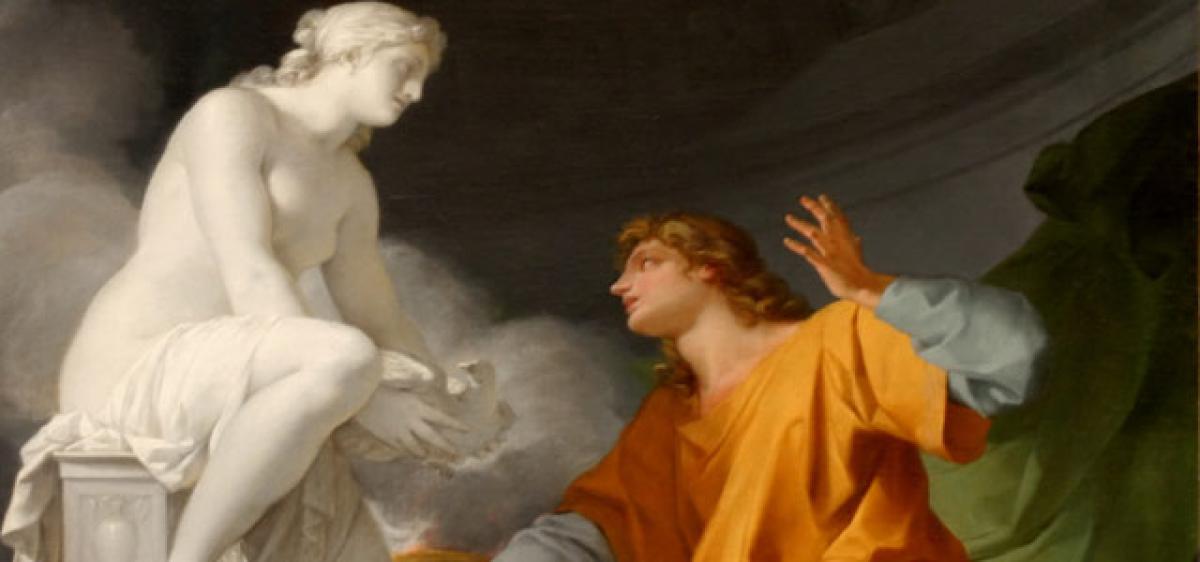The course of a Greek myth

Does only economic status determine social class, or do other determinants – speech patterns, apparel, mannerisms and the like – play a part? And if so, will changing them mean upward – and irreversible – social mobility for all (across gender)? These questions have been much debated, but never so entertainingly as in this play, named after a mythological Greek character, and its numerous adaptati
Popular Greek myths have been adapted in myriad versions across the world in a variety of mediums; each uniquely handled raising issues of social impact
Does only economic status determine social class, or do other determinants – speech patterns, apparel, mannerisms and the like – play a part? And if so, will changing them mean upward – and irreversible – social mobility for all (across gender)? These questions have been much debated, but never so entertainingly as in this play, named after a mythological Greek character, and its numerous adaptations.
First century Roman poet Ovid, in his ‘Metamorphoses’, tells the story of the sculptor, Pygmalion, who crafts a statue of his idea of a perfect woman, falls in love with "her" and then prays successfully to the gods (it was Ancient Greece) to grant her life. Variants and versions of this tale have echoed down ages and traditions, but it is a modern, more figurative – and realistic – version that we happen to be more familiar with.
This was the theatrical adaptation by Anglo-Irish playwright George Bernard Shaw in the early 20th century.
Although not the first adaptation in modern times – playwright WS Gilbert (of the famous Gilbert-Sullivan duo) produced a stage version in 1871 and a burlesque soon followed – Shaw's ‘Pygmalion’ (1913) is his most famous and most influential, raising issues of artificial social divides, gender roles and women's emancipation.
The story begins with a socially diverse crowd, sheltering from rain under the impressive portico of a London church. Some of them get suspicious of a middle-aged man, who seems to be noting their words, especially of a Cockney "flower girl" trying to make a sale to an amiable gentleman of apparent military background. The note-taker is, however, no police detective but phonetics specialist Henry Higgins doing research.
As Higgins calms – or rather upbraids – the girl for her excessive sensibility and "barbaric" sounds while winning over the crowd by unerringly identifying the area they hail from, it turns out he and the older gentleman, who is Colonel Pickering, author of ‘Spoken Sanskrit’ know of each other by reputation.
As they leave for dinner, Higgins bets he could pass off this girl – "this creature with her kerbstone English: The English that will keep her in the gutter to the end of her days" – as a "duchess at an ambassador's garden party" with a few months training in accent and instilling some upper-class mannerisms.
And then the same girl, Eliza Doolittle, shows up at Higgins' house next morning and expresses interest in his offer. Higgins, blind beyond his own skills, takes her up despite reservations expressed rather forcefully by his housekeeper (and to some extent by Pickering) and then by his mother.
Seeing off these and other obstacles like Eliza's "imaginatively moral" father and persevering despite a setback or two, he makes good his challenge. But Eliza, tired at Higgins' treating her as a mere experiment and lack of appreciation, blows her top and stomps off. But what is to become of her, made now too genteel to return to her former life but without the wherewithal to sustain herself in an upper-class existence? And what do Higgins and Eliza really think about each other?
Performed first in early 1914, it went on to inspire English, Dutch and German film versions in the 1930s and the pair of lyricist Alan Jay Lerner and composer Frederick Loewe in 1956 adapted it into a successful Broadway play ‘My Fair Lady’.
Besides becoming an acclaimed, multi-Oscar winning film in 1964 with some of the same cast as the stage version, this slightly romanticised version would go on to inspire plays in languages varied as Gujarati to Georgian and Marathi to Polish, a Bollywood film with Dev Anand, a Bengali film starring Uttam Kumar, TV series in Turkish and Greek and more.
Lerner's version mostly remains true to the original, though replacing some dialogue with topical songs at suitable spots, reducing presence of characters like the Eynsford-Hills save the infatuated Freddy, and changing venue of Eliza's first high-society public appearance. But the greatest change – like most stage and film adaptations – was the about the Higgins-Eliza relationship.
While Shaw's play actually ended with Higgins' loud laughter at Eliza's plans to marry Freddy, its performances ended with a happier ending in line with the audience's expectations. The playwright wasn't amused and used his past as a novelist – though unsuccessful – to attach an epilogue, detailing the characters' later life and why Higgins and Eliza are not meant for each other.
Lerner was not convinced and his versions have an ambiguous ending where the two are reunited, after a stormy fight, but in what way exactly is left to the viewer's imagination.
What is more important is the questions it raises about social impact of language and its gender divide, especially how Higgins can swear and be rude to his heart's content but Eliza can't. Have we passed this barrier?














